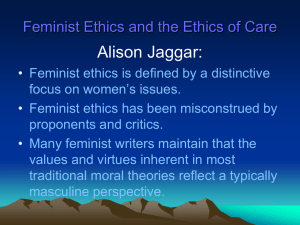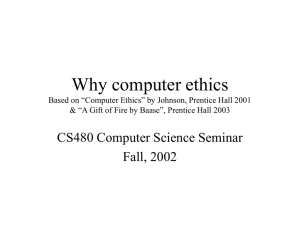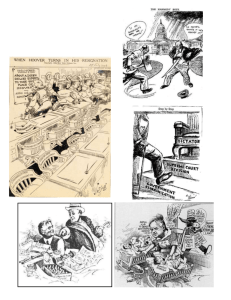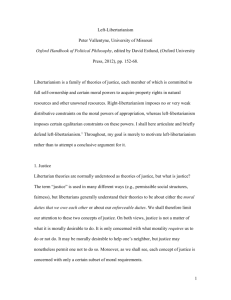notes (2014)
advertisement
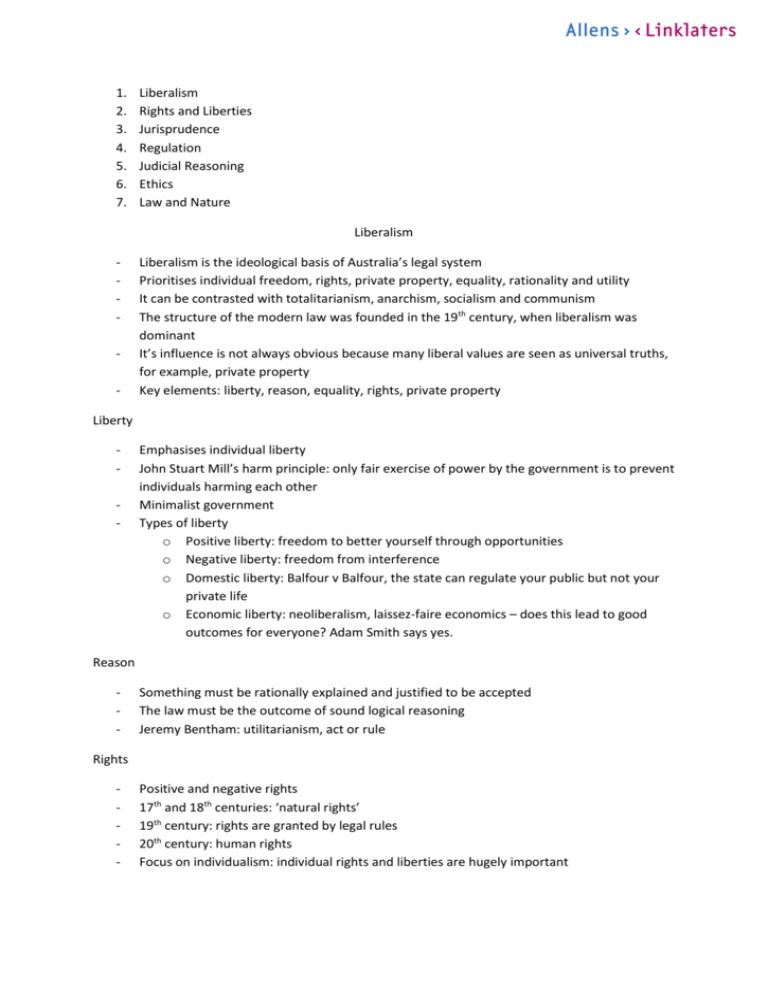
1. 2. 3. 4. 5. 6. 7. Liberalism Rights and Liberties Jurisprudence Regulation Judicial Reasoning Ethics Law and Nature Liberalism - Liberalism is the ideological basis of Australia’s legal system Prioritises individual freedom, rights, private property, equality, rationality and utility It can be contrasted with totalitarianism, anarchism, socialism and communism The structure of the modern law was founded in the 19th century, when liberalism was dominant It’s influence is not always obvious because many liberal values are seen as universal truths, for example, private property Key elements: liberty, reason, equality, rights, private property Liberty - Emphasises individual liberty John Stuart Mill’s harm principle: only fair exercise of power by the government is to prevent individuals harming each other Minimalist government Types of liberty o Positive liberty: freedom to better yourself through opportunities o Negative liberty: freedom from interference o Domestic liberty: Balfour v Balfour, the state can regulate your public but not your private life o Economic liberty: neoliberalism, laissez-faire economics – does this lead to good outcomes for everyone? Adam Smith says yes. Reason - Something must be rationally explained and justified to be accepted The law must be the outcome of sound logical reasoning Jeremy Bentham: utilitarianism, act or rule Rights - Positive and negative rights 17th and 18th centuries: ‘natural rights’ 19th century: rights are granted by legal rules 20th century: human rights Focus on individualism: individual rights and liberties are hugely important Private property - Bundle of rights including possession, use and distribution of something Fundamental principle of liberalism Efficient, right to the fruits of labour etc Equality - Equality before the law means everyone has the same rights and obligations regardless of gender, age, sex etc UDHR and ICCPR Formal equality vs substantive equality Rights and Liberties - Progression of thinking about rights (see above) Tension between rights and utilitarianism (i.e. individual rights vs the greater good) Hobbes: 1651 Leviathan says that in the state of nature life is solitary, poor, nasty, brutish and short, so we form a social contract to give up some rights to a sovereign Locke: 1689 Two Treatises state that we need the sovereign to protect our property and the law to resolve property disputes Bill of Rights - - - 1689 English Bill of Rights o freedom of speech in parliament; o freedom from cruel and unusual punishments, and excessive bail; and o freedom from fines and forfeitures without trial. o Constitutional monarchy, parliamentary supremacy 1791 US Bill of Rights o Freedom of speech, press, assembly and petition o Right to keep and bear arms o Protection from quartering of troops o Protection from unreasonable search and seizure o Due process, double jeopardy, self-incrimination, eminent domain o Trial by jury, rights of accused, right to counsel o Civil trial by jury o Prohibition of excessive bail, and cruel and unusual punishment o Protection of rights not specifically enumerated in the Bill of Rights o Powers of states and people Also international human rights declarations (UDHR, ICCPR etc) Rights and Liberties in Australia - Western democracies with a bill of rights: o UK, USA, Canada, New Zealand, France, Germany, Italy, Greece, Finland Western democracies without a bill of rights: o Australia Rights in the Australian Constitution o the right to direct elections: ss 7, 24; o the right to insist that property be compulsorily acquired on just terms: s 51(xxxi); o the right to trial by jury: s 80; o the right to freedom of interstate trade, commerce and intercourse: s 92; o the right to freedom of religion: s 116; and o the right to non-discrimination of state residents: s 117. o IMPLIED right to freedom of political communication Jurisprudence - - - Branch of philosophy concerned with the nature of the law Theoretical questions about the nature of law/legal systems o Purposes of law o Resolve disputes o Create social order o Reflect community values o Help the disadvantaged o Stabilise the economy o Prevent misuse of power Difference between o What law ought to be (normative, value laden) o What law is (rule-bound, requiring coherency) Do laws have to be consistent with morality and justice? o Natural law theory o Legal positivism Natural Law Theory - - Rules reflect God’s law, the law of nature and objective principles of morality and justice o Discoverable by reason o Superior to state-made law o Universal, applies to all, unchanging E.g. there is a principle that children should be looked after by their parents, therefore parents have some legal obligations to children Aristotle: lex injusta non est lex Thomas Aquinas : all human law is judged against natural law, and because well-made human law is the law od God, it must be obeyed John Jocke: overthrow a government which fails to protect life, liberty and the pursuit of happiness Natural Law Theory Today: - Recognition of universal moral values according to which wartime atrocities etc can be objectively condemned Bill of rights Basic/universal human rights Legal Positivism - Focus not on what the law ought to be, but what it is Law is a social construct, created by people – ‘the social thesis’’ Unconnected to morality ‘separation theory’’ Locke: created by men, all that matters Bentham: must focus on what law is - - John Austin: ‘command theory’ – law is a set of commands from a sovereign obeyed because of a threat of punishment Hans Kelsen: scientifically rational system of coercive norms that form a hierarchy o All laws are validated by a superior law o Superior law s are validated by the ‘grundnorm’ HLA Hart: system of primary and secondary legal rules which derive their legitimacy from the ultimate rule of recognition Feminism in Law - Is substantive or formal equality the goal? There are boundaries to women in the legal profession (as in other professions) o Sexual harassment o Childcare o Housework o The third shift Regulation - Regulation has a long history Tudor period, industrial revolution, welfare state 1970s: renewed focus on regulation 1980s, 1990s - Privatisation, Reagonomics, Thatcherism Cost of regulation, red tape, economic deregulation and free market ideologies Mass deregulation Mid to late 1990s – 2000s - Development of post-privatised state Away from neoliberal approaches Accountability, efficiency, fairness Regulated industry Currently - Shift away from command and control, compliance and deterrence based theories Move towards increasing self-regulation Move towards responsive regulation Command and Control Theory - Exercise of government influence by imposing standards backed by sanctions Using the force of law to prohibit certain forms of conduct Demand positive action by regulated Lay down conditions for entry into a sector Problems o o o Legalism: strangles creativity and restricts flexibility Enforcement: box-ticking, name and shame Capture: relies on those who are regulated to comply Self-Regulation - - - Requires an organisation/group to regulate itself or act governmentally Self-regulation appears to lack government involvement o In practice, founded on implicit governmental threat o Don’t act or behave correctly, then we’ll step in Advantages Include o Expertise o Greater understandings of regulated entities and cultures o Self-regulators have special knowledge of regulated o Increases regulatory effectiveness o Cost efficient and easier to implement Problems o Lack of mandate o Capture o Enforcement o Accountability Responsive Regulation - Ian Ayers and John Braithewaite Reglatory strategies pyramid, enforcement sanctions pyramid - Legal problems are multi-faceted Important to think about social and cultural considerations Go beyond ideas of command and control ‘ Judicial Reasoning - - - Role of the Judge o Determines the relevant law to be applied o Ensures that the rules of evidence and procedure are followed o Resolves questions of law and when there’s no jury questions of fact also Doctrine of precedent o The law is consistent and predictable o There must be good reason to depart from it Judges have different tenure o Most judges are respected barristers, and work through the court hierarchy o Independent of executive government which appoints them o Immune from attempts to lower salary o Liability: immune o Judges can very rarely be removed o Separation of powers Judicial Reasoning - Legal reasoning used to make a decision by a judge Is this impartial, objective and rational? Is this just a process, or is there more to it? Orthodox Views - Judges make practical, rational decisions based on the law No intuitive/emotional response, do not take consequences into account IRAC: use only the existing law to make a decision Strict Legal Formalism - Judges IRAC all day every day The judge should only apply existing legal rules, and should not refer to external considerations such as political or moral values, or practical consequences. Benefits: It increases the likelihood that those who are subject to the law will know what conduct the law permits or prohibits. Judges may be biased if they try to do justice on a case-by-case basis. Formalism is consistent with democratic theory. Moderate Legal Formalism - Kirby J: common law is naturally creative HLA Hart: two exaggerations about the law 1) Legal system is a mechanical, closed and logical system 2) Legal rules do not dictate answers to any legal cases - Legal rules are MOSTLY determinate but not totally CORE OF CLEAR MEANING PENUMBRA OF UNCERTAINTY CLEAR EXCLUSION - - Judges can have discretion in hard cases Lon Fuller: two objections 1) Not all rules have a core of clear meaning – it comes from context 2) Judges should not always apply rules when the meaning is clear anyway Dworkin: in hard cases, distil a principle Radical Views - - Rejection of formalist thinking - understand law as culture o Law is not separate from social structures and practices. o Law is not value neutral. o Law can only be understood by reference to social context. Legal Realists and Critical Legal Studies Legal Realists - - Oliver Wendell Holmes Jr o Law is not determinate o Law is not neutral and objective o Law cannot be viewed in isolation There is not a ‘correct legal decision’ Critical Legal Studies - - 1970s and 1980s at Harvard Law School o Law is not determinate o Law is not neutral and objective o Law cannot be viewed in isolation Later splinters into race/feminist theories Judicial reasoning o Indeterminacy o Involves external considerations o Goes further: this process allows power to remain in the hands of a few people Ethics - Consequentialism, e.g. utilitarianism Deontologicalism, e.g. Kantian theory Virtue ethics Ethics of care Ethical rules influence legal rules, and legal rules influence ethical rules Sometimes law and ethics conflict (i.e. something may be legal but unethical) Traditional View of Ethics in Law - - “An advocate, by the sacred duty which he owes his client, knows in the discharge of that office but one person in the world, that client and no other. To save that client by all expedient means, to protect that client at all hazards and costs” This is essential to the operation of the adversarial system Provides a rule that gives the greatest access to justice for all However, this will sometimes achieve undesirable results and may develop negative traits in lawyers Responsible Lawyering - Moral activism A lawyer is an agent of the legal system There is a responsibility to ensure the fairest working of that system Lawyers are bound by morality Ethics of Care - Focus not on individual client, but on relationships and the community Lawyer has a more holistic duty to act in accordance with the best interests of the community Law and Nature Is moral status possessed by? a) Humans only? b) Animals? c) All living organisms? Humans Only - - - This is called anthropocentrism Obligation to animals and the environment is to the extent that is suits human purposes Environmental concerns cached in human effects (e.g. pollution threatens human health) Justifications o Religious o Scientific o Catesian o Kantian Religious o Man is in charge of the earth and all the animals as per Genesis Scientific o Man is at the top of the food chain Descartes o An animal is not conscious, and therefore we owe it no more duty than a mere mechanical animal Kant o No specific duty to animals, however treatment of animals influences and reflects the way we treat other humans Animal Rights - Two main positions Animals have some rights though not as many as humans Animals have equal rights to humans Unequal Moral Status - Being sentient gives moral status Animals are sentient Animals therefore have moral status Humans have greater rights on the grounds that they are human beings Equal Moral Status - Giving unequal status is speciesism Peter Sing said this was the same as racism or sexism In order to justify it, there must be something intrinsic to humans that animals do not have - Any possible property is lacked by at least some humans, but they still have equal moral status Any property that all human beings have, some animals also have Therefore animals have equal moral status All Living Entities - We have duties to holistic entities, for example, to the environment and ecosystems This is used to justify things like culling to preserve ecosystems Radical ecology calls for us to change everything we do in relation to the environment This is because environmental law is generally anthropocentric Animal Law - Animals are treated as chattels They equate to objects Animal welfare laws regulate the treatment of animals Animal Care and Protection Act QLD 2001 Definitional of animal cruelty and duty of care to animals




